Over the course of this blog series we hope to teach you a little about the mysterious world of SEO and ultimately how to rank higher in Google. Helping you understand both how it works and how to action it yourself.
So how do you rank higher in Google search results? The simple answer to this question is Search Engine Optimisation. Search Engine Optimisation or as it is more often known as, SEO, is the process of optimising a piece of content for ranking. SEO consists of a number of processes but at a very basic view SEO is just 4 simple steps.
- Research Keywords. Find a keyword that is relevant to your company and that lots of people are searching for each month. Avoid using generic terms such as ‘Builders’ instead use ‘Builders in London’.
- Research competitors. Find out who is currently ranking for this keyword. Read their content, how do they write? Is it good? What does their website look like?
- Create a piece of content around this keyword. Be it a quality blog post or a service page, just make sure that it is significantly better than what is currently ranking for the Keyword.
- Gather backlinks. Arguably the most difficult step. Make sure that they are relevant for this content and your business overall.
And that’s it.
Of course the actual implementation of this is a little more difficult but it is certainly nothing magical.
How to Rank Higher in Google. So how exactly does SEO work?
Well there are a few factors that search engines like Google, take into account when it comes to determining your rank. Google is a little secretive on what exactly these are, claiming to have over 200 hundred ranking factors. But luckily for us we know the ones that really make the difference.
 1. Content
1. Content
The specific content on a page is a huge factor in not only where it ranks but what it ranks for. If you want to rank higher this is where you need to start.
Google has what are known as bots. These are little pieces of programming that run around the web searching people’s websites. When you ‘Google’ something and head onto a website, you are not actually looking at the live internet but rather a indexed version made by Google. Google won’t tell us exactly how often these Bots crawl the web but we know that pages with higher ranks scores get crawled more often than those with a lower rank.
Content is so important, you can’t expect to write a boring post and still rank. You need to make sure that you are putting out quality interesting content. Things that your customer base want to know. People often ask me “How often should I blog?”. This not really the question they should be asking. How often you blog is irrelevant. I know people who blog once a week but never rank for a single thing and I know people who hardly blog once a month but rank highly every single time.
When writing make sure you have researched your keywords correctly. Try to answer a question. Make yourself the knowledge base in your industry and avoid selling yourself constantly. If you write quality content you are more likely to impress people and they may just give you an all important backlink.
People often complain that their job is too boring to write interesting content about, but I have never once found this to be true. While you may think this, your customers may not. They have questions about your job, about how you do it or even how to do it themselves. Don’t be afraid to tell people how to do it themselves. It proves you know what you are talking about. Studies have shown 74% of people who research how to complete a job themselves end up getting professional help in the end. Then when it comes to choosing that professional they are more likely to return to you.
Stand out as interesting, informative and overall knowledgeable.
 2. Backlinks
2. Backlinks
Backlinks are hugely powerful. Backlinks are links coming for someone else’s site to your own. As I said the number and quality of backlinks are one of the main factors Google uses to determine your rank.
Search Engines looks at backlinks as a way to determine the quality of your site. As it stands to reason that a site pushing out high quality content is more likely to be linked to by others, than one that does not put the work in.
When it comes to backlinks there are two attributes they are given – DoFollow and NoFollow.
DoFollow
DoFollow links are followed by Search Engine bots and therefore can give power/authority to the site they lead to.
NoFollow
As the name suggest NoFollow links are not followed by Search Engines and so hold no SEO value. All Social Media links are NoFollow.
You want to have more DoFollow links than NoFollow links. Of course there is different types of backlinks and each holds a different amount of power.
- Top Level backlinks – These are backlinks from the home page of a website. These backlinks hold more power than those from secondary pages within a site.
- .GOV backlinks – Any backlink coming for a website with the domain of .gov in the UK hold huge amounts of power as Search Engines know this is a government website and therefore their link holds a large amount of authoritative power.
- Relevant site backlinks – These are arguably the most powerful backlinks of all. These are backlinks coming from sites that are within the same industry as you.
Whenever I run my SEO workshops I usually use this analogy for Relevant site backlinks:
There is a restaurant critic who runs an extremely popular food blog, he blogs high quality and high ranking content so his site hold a lot of authority. One night he goes out to a brand new restaurant and has a fantastic meal. He writes a blog about it and how much he enjoyed the meal, along with a link to the restaurants website. Because of his popularity and high rankings the link he gives to the restaurant will allow their ranking to improve greatly. Another day he has to take his car to the garage and the mechanic does a amazing job and fixes his car. He later writes a blog thanking the mechanic and adds a link to the garage website. Even though this link if from the same blog. This link will hold much less powerful than the link to the restaurant because it is not relevant to his site.
This is why the relevance of backlinks can make such a huge difference when it comes to ranking higher throughout the web.
For more SEO information check out the next part in the How To Rank Higher in Google Series Or check out our Online Marketing page.

